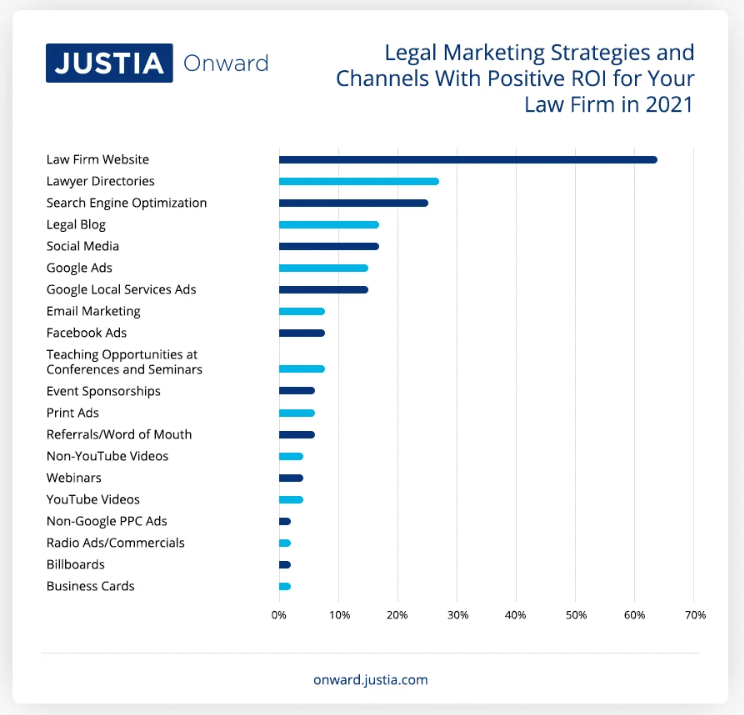Criminal Defense Marketing: How to Increase Business
By Morgan Martinez

Criminal defense firms often face two major challenges: addressing significant market competition and generating qualified leads. Without a marketing strategy to differentiate your firm and connect with targeted prospects, your practice will struggle to profit.
The following guide will cover the basics of criminal defense marketing. This includes why your firm should invest in a marketing plan, as well as five best practices for criminal defense attorney advertising. Let’s get started.
What is Criminal Defense Marketing?
Criminal defense marketing is the process of promoting a firm’s legal services to develop and retain business. Marketing for criminal defense attorneys centers on four pillars:
- Branding—Differentiating a firm from its competition
- Law firm reputation management—Generating positive reviews, managing negative ones, and developing a media relations strategy
- Inbound marketing—Creating and disseminating content to build brand awareness and draw prospects to a firm’s website; e.g., content marketing, search engine optimization (SEO), lawyer directories, and a local marketing strategy
- Outbound marketing—Reaching out to prospects to generate interest in a firm’s legal services; e.g., criminal defense advertising on billboards and radio
Why is Criminal Defense Attorney Marketing Important?
Many law firms struggle to reach prospects and convert leads into new business. In fact, nearly 70% of surveyed legal professionals said that getting clients was a challenge for their firms, according to the MyCase 2021 Legal Industry Report.
Without a strategic, automated approach to lead generation, lead management, and client intake, lawyers waste valuable time and money. This hurts productivity, client service, and firm profitability.
The four pillars of criminal defense attorney marketing enable your law firm to efficiently produce leads. For example, a legal marketing trends survey conducted by Justia (a legal information retrieval service) revealed the following.
- Almost 40% of lawyer respondents said their law firm websites produced the most leads out of all lead generation strategies and channels. (Presumably, these websites featured client intake forms to capture lead information.)
- Google local services advertisements came in second place, with 11.1% of surveyed attorneys claiming it was their most effective marketing tool.
- When asked about the law firm marketing channels that produced a positive return on investment, attorneys indicated law firm websites (64.7% of respondents), lawyer directories (approximately 27% of respondents), SEO (roughly 25% of respondents), and a legal blog (around 17% of respondents).

Source: Justia
Best Practices for Criminal Defense Marketing
The key to marketing for criminal defense attorneys is pursuing high-impact strategies that generate brand awareness and reach prospects with the firm’s desired case type(s). This can include people charged with drug crimes, traffic offenses, and violent crimes—just to name a few. Below are five tips for creating an efficient criminal defense attorney marketing machine.
1. Optimize Your Website
Your firm probably has a website—94% of law practices do, according to the American Bar Association (ABA). And for good reason: A legal website showcases your firm’s unique brand and services, explains why potential clients should choose you over competitors, and allows prospects to get in touch.
But having a website is not enough. You must optimize it to attract leads and convert them into clients. Consider the following suggestions.
- Choose a secure, reliable law firm website hosting provider.
- Optimize your website for mobile devices, such as smartphones and tablets. Only 69% of lawyers claim their firm’s website is mobile-friendly, per the ABA.
- Ensure that your brand sends the right message. Learn more in our law firm branding guide.
- Integrate a client portal for better service and easier collaboration. The MyCase Client Portal, for example, facilitates secure client communication, document exchange, invoicing, and online payments.
- Implement automated client intake tools. More than 50% of surveyed lawyers said that their firms captured more leads using online intake forms, according to the MyCase 2021 Legal Industry Report. For example, MyCase client intake forms eliminate the manual work of gathering prospect information. Your team can customize intake form templates for each practice area and stage of onboarding. Then, easily embed them on your website with your firm logo. When a lead submits their form, their information syncs directly to a file on your MyCase dashboard and you receive an alert. If you retain the client, their information transfers to their case file to minimize administrative work.

2. Engage on Social Media
In the past, people seeking legal advice often turned to the yellow pages. Today, many prospects head to Facebook, LinkedIn, and similar platforms. Engage your audience on social media to make the most of your criminal defense attorney marketing.
First, figure out which platform appeals to your prospects. For business-to-consumer companies like criminal defense law firms, Facebook is the most popular social media channel. More than half of all business-to-consumer marketers rank it as their number one choice, according to a survey conducted by Social Media Examiner (a social media education company).
Then, brainstorm topics that may resonate with prospects. For example, if your target audience is people who have been charged with intoxication offenses, perhaps your potential clients would be interested in these topics:
- 10 DUI/DWI facts that all drivers should know
- What to expect after a first DWI offense
- How might DUI/DWI affect your license?
- What to do if law enforcement wants to question you
Next, experiment with various types of social media posts to see which receive the highest engagement (in terms of likes, shares, comments, downloads, etc.). Are 30-second videos the most popular? What about infographics?
Finally, consider investing in criminal defense attorney advertising. With paid Facebook posts, for instance, you can promote your law firm’s business page to a targeted audience that meets your criteria. This can grow page likes and followers more quickly. Paid posts also allow you to guide traffic to your law firm’s website or promote consultations.
Tip: Read our comprehensive guide to marketing your law firm on social media. You’ll learn the ins and outs of social media marketing, ethics issues to consider, and strategies for building a robust social media presence for your firm.
3. Dive Into SEO
SEO is a must-have tool in any criminal defense marketing toolkit. In a nutshell, strong SEO enables your website to appear in the top results of search engine results pages (SERPs).
Build a strategy so your site and content are on the first page of the SERP when prospective clients search for keywords that are relevant to your law firm. For example, if your domestic violence article appears on page one for a Google search on “what to do after an arrest for domestic violence,” you have a much greater chance of capturing website traffic. The greater your website traffic, the better your chances of converting more prospects into clients.
There are several types of SEO, including on-page and local SEO.
On-Page SEO
Also known as on-site SEO, on-page SEO focuses on optimizing the various parts of a website, such as page content and HTML code. The goal is to help search engines and users understand what the site is about. Here are the best ways to promote strong on-page SEO:
- Include relevant keywords throughout your website
- Create in-depth, valuable content for your prospects and clients
Learn how to build a content strategy from scratch in our attorney content marketing guide.
Local SEO
These law firm marketing techniques help your practice appear in local search results on Google—such as when a user searches “criminal defense attorney in Raleigh.” Local SEO can be particularly helpful for criminal defense marketing since many attorneys in this practice area tend to serve clients in a limited geographic area. Read more about developing a local Google SEO strategy in our article, How to Use ‘Google My Business’ for Lawyers.
Bonus: Download the Ultimate Guide to SEO for Lawyers as well. It’s free and full of actionable tips for optimizing your website for search engines and prospects.

4. Leverage Pay-Per-Click Advertising
If you’re ready to devote financial resources to your criminal defense advertising, try pay-per-click (PPC) ads. Your law firm will bid to appear prominently on a SERP for a specific keyword phrase. When a potential client searches for that phrase and clicks on your ad, you’ll pay a fee for the website traffic.
Learn more about PPC ads in Lawyer Leads: How to Generate and Retain Clients. This guide discusses whether PPC ads are worth it for lawyers, average cost-per-click, and how to calculate essential metrics.
For general advertising education, including a comparison of the top ad avenues for lawyers, check out Law Firm Advertising: Top Ways to Grow Your Clientele.
5. Generate Referrals
In a study of 10,000 accounts in a large German bank, researchers found that referred customers are nearly 20% more loyal and 16% more profitable than other customers, according to Harvard Business Review.
Every satisfied client bolsters your brand and opens the door to new revenue streams. As a result, referrals are one of the most valuable criminal defense advertising tactics.
To generate word-of-mouth business, focus on developing client management skills and processes that build positive relationships. Also, don’t forget to ask happy clients for referrals in your final letter and/or via phone call. Many satisfied clients may be willing to refer your firm when reminded politely.
Tip: Explore Offline Networking, our guide to generating referrals for law firm growth.
Manage Your Criminal Defense Marketing Leads with MyCase
When you’re busy serving clients and marketing your firm, efficiency is key. Criminal law software can streamline your practice so you’re free to focus on completing billable work and meeting deadlines. With MyCase lead management and client intake tools, you can track, manage, and convert new business in one place.
Features include:
- Creating customized client intake forms and embedding them into your website
- Using our law firm CRM to track prospects through various stages of your lead pipeline
- Gathering signatures for retainers and agreements more quickly via MyCase eSignature
- Generating invoices in minutes and collecting consultation fees using MyCase billing and payments software
Try MyCase at no cost for 10 days with your risk-free trial. There’s no commitment, and you can use pre-populated sample data or import your own.
For more tips on lead management, client intake, payments, and attorney best practices, subscribe to our complimentary email newsletter, “For The Record.” Just enter your email in the right-hand sidebar near the top of the page.




